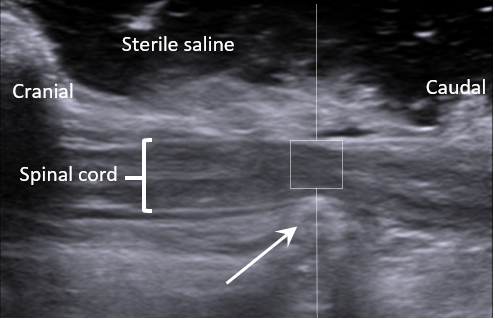
Scan showing spinal cord injury
CVS’ Highcroft Referrals Neurology Team Trials Mannitol To Speed Recovery Of Walking In The Acute Phase Of Paralysis In Dogs
Over the last six months, clinical neurologists at CVS’ Highcroft Veterinary[i] referrals have been undertaking a randomised control clinical trial for dogs with acute spinal cord injury.
Led by neurologists Helene Vandenberghe and Nicolas Granger, the research aims to assess the effect of mannitol on the recovery of walking function in dogs presented as emergencies for paralysis caused by intervertebral disc herniation (slipped disc).
Disc herniation is incredibly common in dogs and can cause a range of problems such as back pain, reduced hind limb movement and paralysis. Disc herniation is typically sudden and leads to rupture of disc fragments towards the spinal cord, creating a trauma (e.g. nerve damage, bleeding in the spinal cord and swelling). The disc fragments can be removed effectively in surgery but we have no treatment that targets nerve damage. Most dogs improve, but it may take many weeks or months for the nerves to recover function. During this time, companion dogs need intense supportive care either in hospital or with the help of their owner. Therefore, regaining walking function more quickly would be advantageous.
The team is proposing that mannitol, a sterile solution known to be effective at reducing brain swelling after trauma in dogs, could also reduce swelling in the spinal cord after disc herniation. The brain and spinal cord together form the central nervous system. Therefore, an injury to the spinal cord, which is typically associated with swelling could, in theory, also be treated with mannitol. This idea might help dogs to recover to walking sooner. In this trial, companion dogs presented with severe spinal cord injury (paralysis) caused by disc herniation receive gold standard decompressive spinal surgery and routine perfusion and may also receive an infusion of mannitol.
To date 30 dogs have been successfully recruited into a preliminary analysis and we are actively recruiting cases. Dovecote Veterinary Hospital and Chestergates Veterinary Specialists’ CVS referrals hospitals have joined to increase case recruitment into a multi-centre trial in order to assess the effect of the treatment on a larger population. The result of the research could have a major impact in first opinion and referral practice, in particular on the way spinal cord injury is managed in the first hours and days after onset.
In connection with this research, the neurology team at Highcroft is undertaking another research project (led by Drs Jon Prager and Nicolas Granger) with the objective to measure swelling of the spinal cord during surgery. This is possible using the ultrasound machine at Highcroft Veterinary referrals which is equipped with specific software that can measure how quickly sound waves propagate within tissue, a technique called ‘elastography’. In essence, ultrasound elastography gives a reading of the ‘stiffness’ or ‘elasticity’ of tissue. Due to the delicate nature of the spinal cord, it is suggested that its structure and therefore its elasticity changes after injury. In a set of preliminary data we have collected, it appears that how much the spinal cord elasticity changes after injury is related to the clinical severity of injury, and we are proposing to continue to describe these changes. In time, this novel measure may allow more accurate prognosis for dogs that have spinal cord injury.
Nicolas Granger, European and RCVS Specialist in Veterinary Neurology (Small Animals) at Highcroft Veterinary referrals, said: “We were keen to conduct trials on mannitol’s effect on the spinal cord, due to the effects the solution has on reducing swelling in the brain. In addition to gold standard treatments we use to treat spinal cord injury, the addition of mannitol is a simple add-on and we are widening the trial with the help of Dovecote and Chestergates referral hospitals. If it proves successful, it could be instrumental in treating dogs with paralysis caused by disc herniation, so that they recover more quickly.”
CVS Group operates across small animal, farm animal, equine, laboratories and crematoria, with over 500 veterinary practices, referral centres and sites in the UK, the Republic of Ireland and the Netherlands. In the last five years the company has invested nearly £80 million in its sites, facilities and equipment, in addition to industry leading training and support, to give the best possible care to animals. For more information about CVS Group visit www.careerswithcvs.co.uk.
[i] Soon to be Bristol Vet Specialists
More from CVS UK Ltd
- Chestergates Veterinary Specialists launches Specialist Dermatology Service
- CVS launches Life Stage Assessment Clinical Improvement Project to champion pet wellness
- Chestergates Veterinary Specialists strengthens surgical team with appointment of Specialist Matthew Smith
- Precise imaging and unconventional fixation resolve challenging tarsal fracture
- CVS Farm Vets launches innovative Sheep Lameness Project to support UK farmers

 3 years ago
3 years ago  1390 views
1390 views
